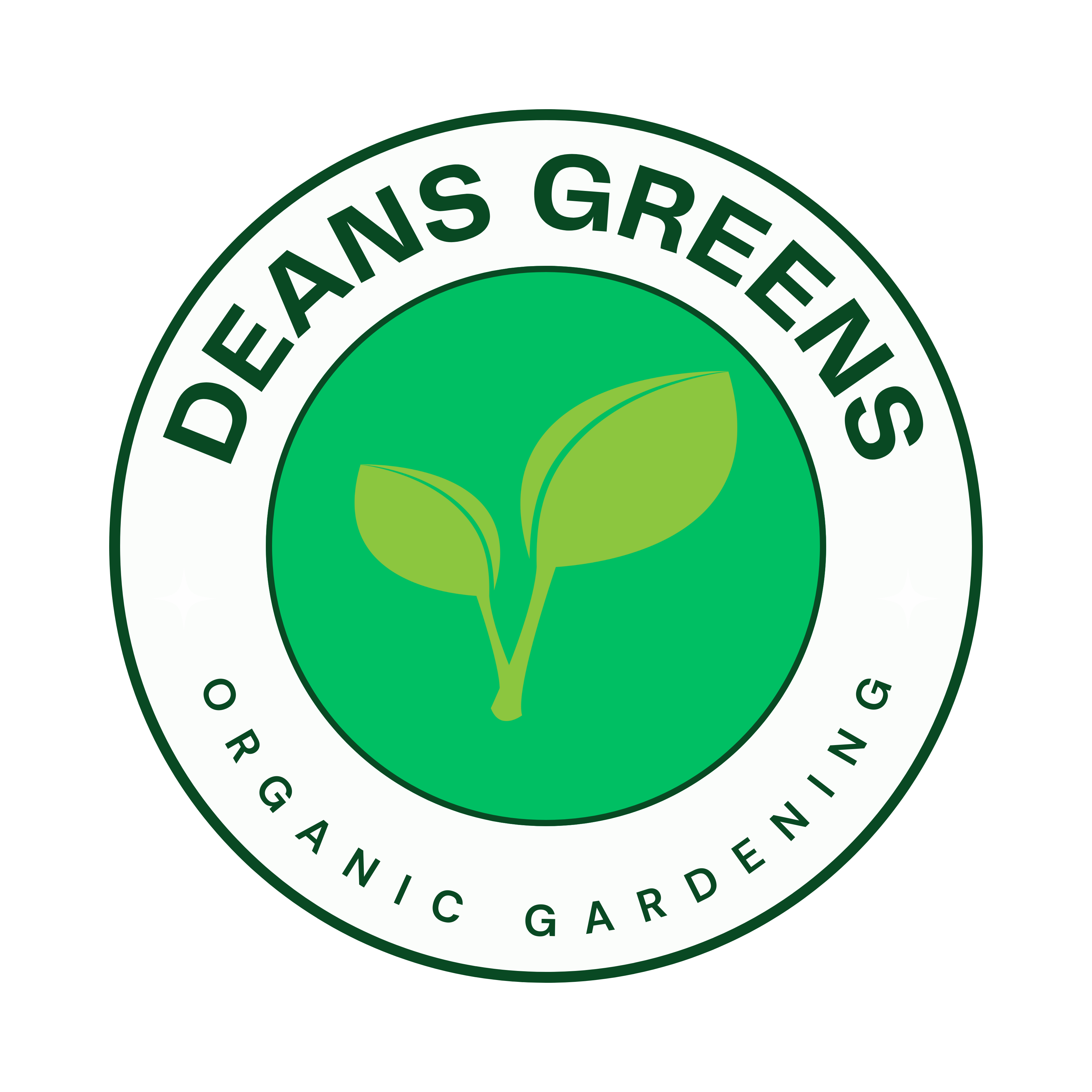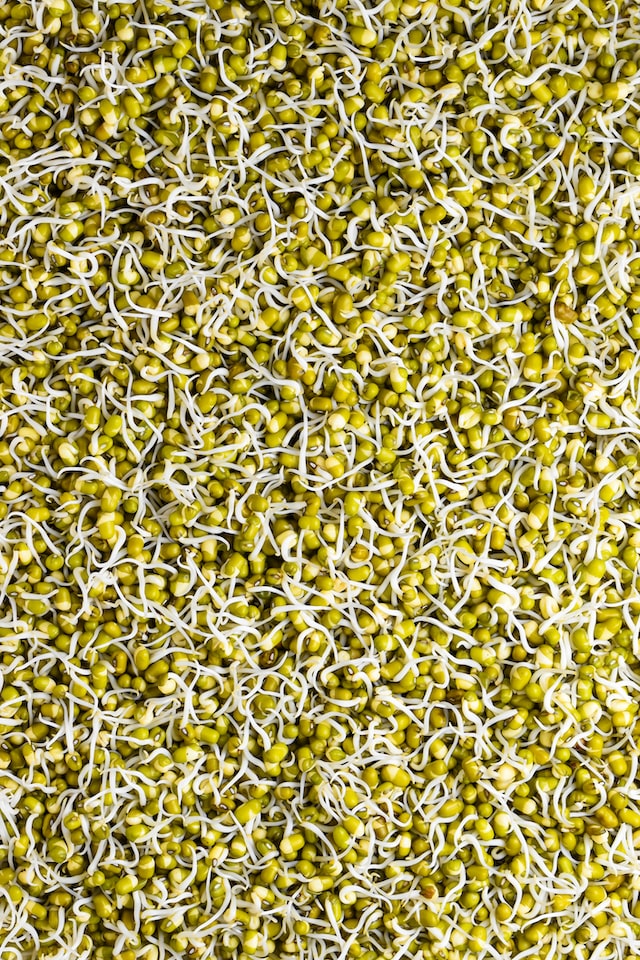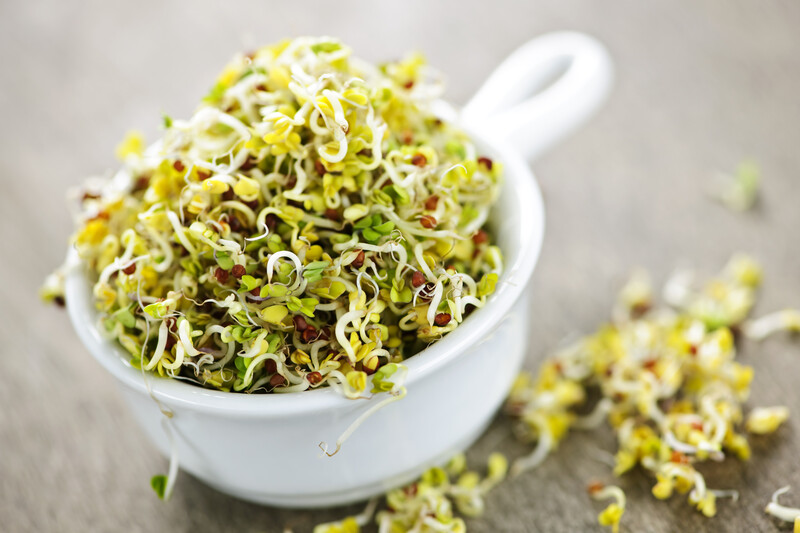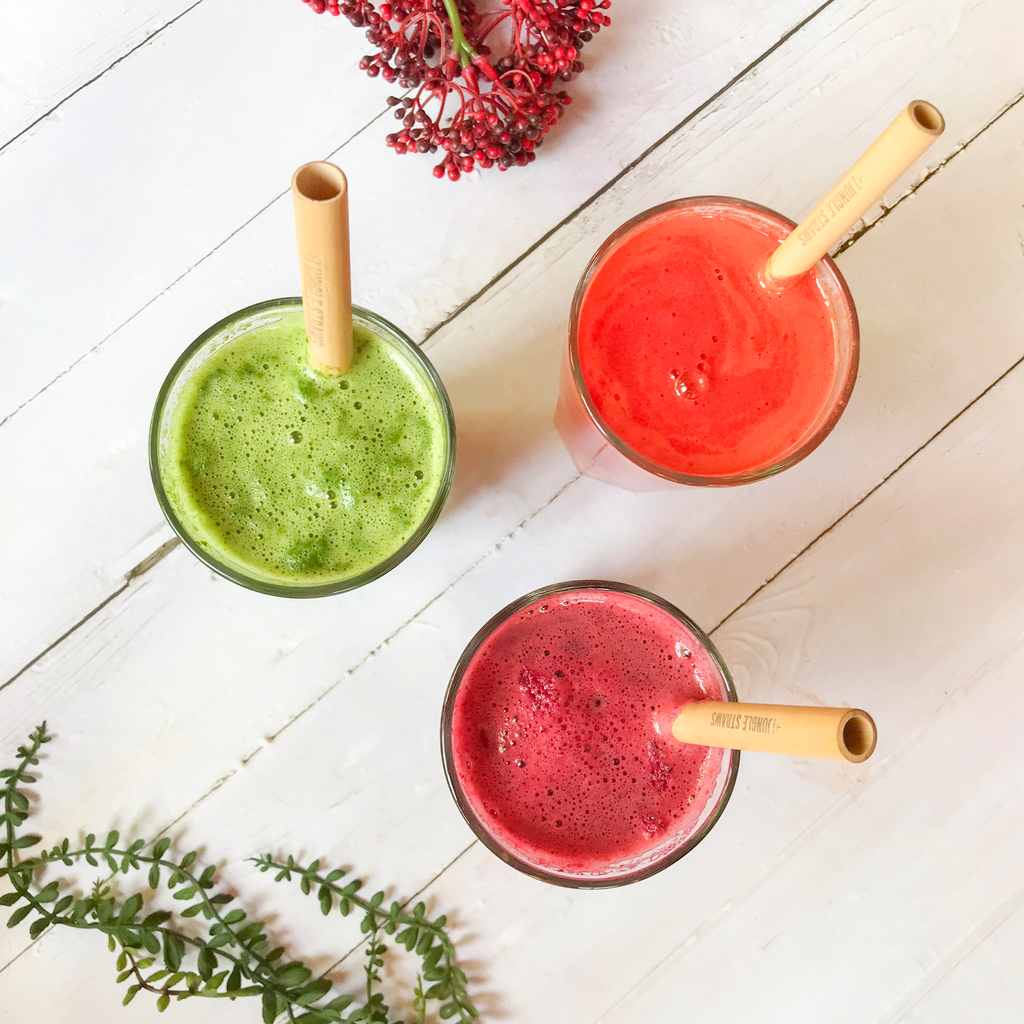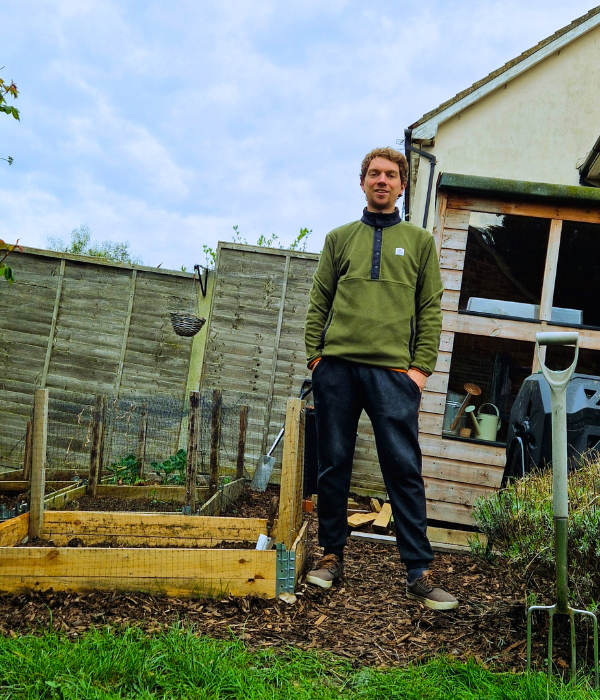Sprouts are tiny baby plants, fully formed just past the germination stage; going quickly from seed to roots and stem.
Growing to just about 2-5cm in length, sprouts form only 1 or 2 small leaves before they are ready to eat.
Some of the most common sprouting seeds include broccoli, alfalfa, kale, radish, leak, sunflower, lentil, chickpea, buckwheat, quinoa, brown rice, soybean, mung bean, and pea sprouts.
To read my top 5 sprouts to grow click here.
Growing sprouts might be one of the best things I’ve ever done, for my health and my wellness!
A big statement but read on to find out 20 reasons why I love growing my own sprouts and think you will too!
1. Sprouts are an easy to grow crop – great for beginners & children
Growing sprouts is a labour of love, just without a lot of… well… labour!
Whether you’ve never grown anything in your life, consider yourself to have a ‘brown thumb’ or have killed nearly every house plant you own, you can hardly ‘grow’ wrong with sprouts. Unless you forget to add water!
Unlike some plants where it’s hard to get the right conditions and easy to forget watering times… Sprouts are so regular and systematised that it actually makes watering them hard to forget.
Just rinse the sprouts with cold water, twice per day, roughly every 12 hours, and leave them on your windowsill where you (and the sun) will easily see them.
They take a minimum amount of work to grow, just a quick water, and then carry on your day as usual while nature gets to work for you.
2. Abundant and fast growth – can grow up to 10 times the size of the seeds planted
All gardening requires some patience, however, if you’ve never grown anything and want a quick turnaround to see the results from your efforts, then sprouts will do just that.
Within just a day or two of watering, you will be able to see the seeds beginning to germinate.
This early sign of life can be enough to encourage you to keep going, knowing that your own homegrown food is well on its way.
Sprouts are incredibly fast growers!
Taking on average just 6 days until they’re ready to harvest, or even just 3 days from seed to plate when sprouting legumes / beans.
3. Requires no soil or grow medium
Soil is the basis of all plant growth. From microgreens to fully grown vegetables, they all grow healthier with both soil and sunlight.
So why don’t sprouts require soil to grow?
Well, many seeds are naturally able to germinate and produce up to 2 leaves with just sunlight and water, no soil.
This is perfect for sprouting, as that’s all the size we need to grow to for an edible sprout.
To grow larger versions of the same plant, beyond sprouting, like broccoli microgreens or fully grown broccoli for example, then soil or some type of growing medium would be required.
Not needing soil keeps this process nice and clean in the kitchen.
No need to wash soil off your plants and containers before eating or storing them.
4. Very low food miles – good for the planet
Food miles don’t come much lower than straight from your kitchen windowsill to your plate!
This is great news for both you and the environment.
Growing our own food is the best way we can all help to cut down on global food emissions.
Not only does this help cut down on emissions, but it also helps cut out any plastic packaging too!
Growing your own sprouts is a nice and simple way of helping the planet and anyone with a window can do it!
5. It creates a deeper connection to your food & a newfound sense of purpose
Growing our own food is not only great for our physical health but our mental health as well.
Just taking something as small as a seed and watching it develop in your glass jar in your kitchen into something so abundantly beautiful and edible can spark a sense of wonder, presenting something amazing to us about the magic of seeds and life.
Learning to appreciate the smaller things in life can really help to shift a person’s perspective.
It has even been shown that harvesting our own grown food can give us a dopamine hit; also known as a ‘harvesting high’.
Any dopamine hit you had to work for is much better for your mental health than quick easy hits i.e. scrolling social media.
6. Can spark a love for growing food – a gateway crop!
Growing our own food is great. We all know we ‘should’ do it yet the idea of doing it seems daunting.
Things like time, space, and know-how can hold us back.
If you’re the kind of person, who like me, always said things like ‘I should really learn to grow some of my own food’…
Only to get overwhelmed on where to begin, putting it off for later, letting life get in the way and never making a start… then maybe, simply planting some seeds in a sprouting jar could be the kickstart you need.
You never know but you may just fall in love with the process of growing your own food and catch the ‘growers bug’.
7. Requires little space & no garden is needed
A lot of us would like to grow some of our own food but it’s not just time that holds us back, it’s space.
Sprouting provides an opportunity for most people to get growing.
With just enough space for one mason jar on the windowsill, you could grow enough sprouts to easily last you the week.
Ideally, sprouts are grown from natural sunlight but for anyone without a window, LED lights are also an option to get sprouting by stimulating growth with artificial light.
8. Tasty (and lots of varieties)
For people who don’t like the taste of a lot of vegetables, sprouts are a great option to easily eat a more nutritious diet.
The kind of sprouts grown at home aren’t varieties of food you would usually find at the supermarket.
This means by home-growing sprouts you can supplement your weekly shop with a portion of additional health food.
With so many different varieties, you can get lost trying new flavours every week, finding the sprouts you enjoy the most and the dishes you can add them to for a flavour boost (and a health boost too).
Check out my personal top 5 sprouts to grow at home.
9. Very healthy & nutritious – natures supplements
Not only are sprouts tasty and full of flavour, they also happen to be one of the healthiest foods on the planet too!
Containing 20-30 times the nutrients of their fully grown adult forms, sprouts truly are a small superfood with a big nutritional profile.
No one sprout variety is the same and so trying, researching and growing different types of sprouts can give you a multitude of easily accessible nutrients from whole foods.
With such high nutritional profiles, sprouts really are like nature’s own supplements.
The nutritional profile of sprouts differs depending on the variety grown but they are generally high in magnesium, folate, vitamin k, vitamin c, protein, fibre, and phosphorus.
Sprouts are also found to be a good source of health-promoting antioxidants.
10. Can easily add to a lot of meals more extra nutrition
Making soup? Avocado on toast? A big hearty salad? Or even a roast?
Whatever it is you’re making, chances are you can reach for your homegrown sprouts and add them to your meal for an easy way to get more natural goodness in.
Try eating the sprouts whole as you grow them to get a good idea of their flavour and figure out what foods you think they’d go well with.
You can also try searching up the nutritional profiles of each so you know which sprouts you’d like to include more of in your diet, then you can mix them into your meals as often as possible.
11. Cheap seeds = cheap food
Growing sprouts is a cheap & easy way to get good healthy foods on your plate!
When you factor in the cost of the seeds you use, spread out over the time taken to grow, and the abundance of food you get at the end, it works out as just pennies per day to grow jars full of this healthy and nutritious goodness.
You can find seeds cheap at small indie shops and help out small businesses too.
Sky Sprouts is one great example with 100g of organic broccoli sprouting seeds from £3.64.
12. Minimum equipment needed to get started
Apart from a small space with adequate sunlight, there’s not a lot more you’ll need to get growing sprouts.
Just a clear jar with a drainable lid and somewhere to drain the water is all you need.
You could get started with items you have lying around the house i.e. a mason jar + a cheesecloth attached over the top with an elastic band + a small container to drain the water into is enough to get started sprouting.
If you don’t have these things available or would like something a bit more stylish in your kitchen, sprouting sets are available online which include large jars, specially designed stainless steel lids and built-in drip trays. Click here to view the same sprouting kit I personally use.
13. Requires nothing but water and sun to grow organically
Not only do sprouts not need soil… they also don’t need anything more than the water you give them and daily exposure to sunlight through the window.
You won’t need to add any fertilizers to encourage growth and definitely no pesticides for these easy-to-grow crops.
This means that once grown, you are guaranteed organically grown, nontoxic crops to eat.
There’s no better way of knowing how your food was grown than by growing it yourself.
14. Can grow all year round
There’s no need to take any extra measures to prepare for that dreaded winter hunger gap when growing sprouts.
These crops grow equally as well indoors in the winter as they do in the summer.
With harvests of fresh, nutritious greens lower and rarer in the winter garden, sprouts can give you a much-needed nutritional boost and keep you going healthy through all seasons.
15. Sprouts help us to absorb essential minerals
Phytic acid is found in some unprocessed plant foods. Mainly in legumes, beans, grains and nuts.
Pytic acid has a number of health benefits but is also known to be an ‘anti-nutrient’ as phytic acid binds to minerals in the digestive tract, creating phytates which then impair the absorption of minerals such as zinc, iron, and calcium.
Naturally, we do not produce the enzymes required to break down these phytates to help increase the bioavailability of these essential minerals. Luckily for us though we now know that the sprouting process helps to release enzymes that can break down phytates, allowing for minerals to be absorbed freely in the body.
Once you know this it’s easy to see why eating these tiny sprouts in your meals is huge for your overall health quality, as well as why plant foods like beans and lentils are even healthier options when sprouted.
This isn’t to say that the unsprouted versions of these plant-based foods like legumes are unhealthy overall. Only to point out a key health benefit that differs when they are sprouted.
‘“Recent studies have shown that phytic acid’s anti-nutrient effect occurs only when large amounts of phytates are consumed within a diet that is already lacking nutrition. It also only affects the absorption of nutrients eaten at the same meal.“
WebMD
With this in mind, mix these superfoods into your plant-based meals and you have help from nature’s own supplement, to better absorb all the minerals your body needs from that meal.
16. Great for weight loss – Small amount of calories
Sprouts are high in nutrients including an abundance of essential vitamins and minerals but they are also low in calories.
This means they qualify as ‘nutrient-dense’ foods as they have a high nutrient-to-calorie profile.
For anyone looking to lose weight, this is great news!
Not only are they low in calories but they also help to manage food cravings as they are high in fiber, making you feel fuller for longer.
Sprouts can also help to prevent the release of the hunger hormone ghrelin, further helping to signal to your brain that you are full up.
17. Can aid in digestion and improve health – live enzymes make them easy to digest
There is no other food on the planet with a higher profile of beneficial enzymes than sprouts.
Sprouts can have up to 100 times more enzymes present than fully-grown vegetables.
These enzymes are great in helping us to digest food easier as they help to boost our metabolism and break down food effectively in the digestive tract so that its nutrients are more easily absorbed.
Legume and cruciferous vegetable sprouts are also high in dietary fibre which makes them useful in regulating digestion.
By feeding our healthy gut bacteria with fibre, they help to produce short-chain fatty acids (SFCAs) which contain natural anti-inflammatory properties. This can be helpful in combating inflammatory diseases such as Irritable Bowel Syndrome (IBS).
The fibre found in sprouts is known as ‘insoluble fibre’ and doesn’t dissolve in your stomach. Instead, it acts as a pre-biotic which helps to feed the good bacteria in your intestines. These bacteria are important in maintaining a healthy digestive system and helping to reduce bloating and gas.
18. Can help to protect us from developing cancer
Diets that are high in acidic foods are well known to create conditions where cancer cells can thrive by creating an increasingly acidic environment in the body.
To reduce the likelihood of these cancer cells thriving it is recommended to eat an alkaline diet.
Sprouts are an alkaline food choice and eating them helps to balance our body’s PH levels to be less acidic. If you are eating foods known to be acidic, like citrus fruits for example, it is a good idea to balance your body’s PH scales by also eating some sprouts around the same time.
A particularly interesting anti-cancer property that is found in sprouts is the phytochemical sulforaphane. There is growing evidence that this compound can help protect our bodies against cancer.
Broccoli sprouts are found to contain 100-140 times more sulforaphane compared to fully grown cruciferous vegetables (which are the most commonly eaten sources of sulforaphane in the world).
“A growing body of data shows that sulforaphane acts against cancer at different levels, from development to progression, through pleiotropic effects.”
PubMed
19. Builds muscle with whole plant foods – a great plant-based protein source
Sprouts believe it or not are actually a great source of protein.
When thinking of a plant-based diet and its primary sources of protein you might think of beans, lentils, and chickpeas… and rightly so!
When we sprout these foods however, we actually increase the protein content and the amino acid profiles of these foods, making them into more complete protein sources.
The protein (as well as other nutrients) is also more readily absorbable and easier to digest when sprouted.
For example, 60ml of sprouted chickpeas contain approximately 9g of protein compared to 5.8g of protein with the same amount of unsprouted chickpeas.
20. Good for cardiovascular health
Sprouts are shown to be good for the heart as they increase ‘good’ cholesterol and decrease ‘bad’ cholesterol.
HDL Cholesterol is known as good cholesterol and high levels of HDL are shown to decrease the risk of heart disease, whereas low levels of HDL can increase heart disease risk.
Studies have shown that eating sprouts demonstrates an increase in HDL cholesterol levels and a decrease in LDL cholesterol (bad cholesterol). High amounts of LDL cholesterol are shown to increase heart disease risk.
By breaking down the bad cholesterol which builds up in our veins and arteries, eating sprouts can improve our blood circulation and overall heart health.
Conclusion
Sprouts are both nutritious and delicious + growing sprouts is fun and can be a healthy addiction!
For me, that decision to grow sprouts on my windowsill escalated to the point where I now have my own allotment space and I am now in the process of setting up my own microgreens farm.
Of course, I still grow sprouts for a healthy all-season crop… as it’s so easy, why wouldn’t I!?
Who knows what kind of happiness sprouting could bring for you?
So why not give it a try and experience the ‘harvesting high’?
If you’d like to give sprouting a go then here is a link to the sprouting kit I use – if you already have mason jars lying around and something to drain the water into then you can start by just buying the lids only.
For a reputable sprouting seed supplier try these small businesses:
Sky Sprouts – A family-run organic sprouting seeds farm in Devon.
Grow Sow Greener – Another family-run organic supplier in Devon with some different seed varieties and 100% eco-friendly packaging.
Need an idea of what sprouts you should grow first?
Check out my Top 5 Healthy Sprout Varieties to Grow at Home here.
If you’d like to geek out even further about the health benefits of sprouts then check out The Sprouting Book by Doug Evans
